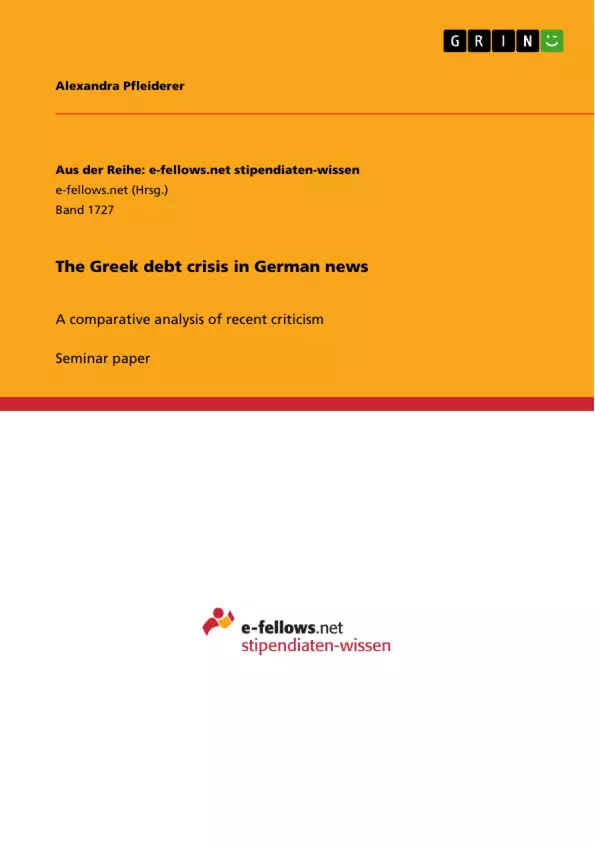The German media has recently been strongly criticized for its coverage of the sovereign debt crisis in Greece. Critics say that journalists tend to represent Greece, its politicians
and the people, in a very negative way. Against the background of the quality news media’s normative role in information coverage and the framing concept, this paper examines how
the German news media covered the sovereign debt crisis in Greece recently, and if the current criticism is justified.
To examine this, I gathered data from the German newspaper
Süddeutsche Zeitung to look at how the Greek debt crisis and the latest events were covered in the time period of 29 June to 19 July 2015. The articles are examined by textual analysis. The findings are contrasted with the theoretical and empirical background and the literature review.
Inhaltsverzeichnis (Table of Contents)
- Introduction
- Theoretical and empirical background
- The normative role of media and journalism in reporting news
- The concept of framing
- Literature review: media coverage of crises in criticism.……........
- Methodology
- Findings
- Interpretation
- Critique........
- Conclusion....
- References
- Appendix
Zielsetzung und Themenschwerpunkte (Objectives and Key Themes)
This study aims to analyze the coverage of the Greek debt crisis by the German news media, focusing on whether recent criticism of the media's representation of Greece is justified. The study will investigate how the crisis was framed in the German newspaper Süddeutsche Zeitung between June 29 and July 19, 2015. This period was a critical juncture in the crisis, marked by the expiry of the second aid program, the bailout referendum, the Euro summit in Brussels, and the intensely discussed "Grexit." The study also examines how the crisis framing compares to past media coverage of economic crises and similar events in other countries.
- The normative role of journalism in a democratic context
- The concept of framing and its influence on public opinion
- The media's framing of the Greek debt crisis in German news media
- Comparison of current media coverage to previous coverage of crises
- The impact of the crisis on Germany and the role of German politicians
Zusammenfassung der Kapitel (Chapter Summaries)
The introduction provides an overview of the study's research question, which focuses on the media's coverage of the Greek debt crisis in Germany. The chapter discusses the background of the study, highlighting the significant criticism that the German media has faced for its reporting on Greece. It outlines the time period and specific events of interest in the study, emphasizing the importance of Germany's role in the crisis due to its financial stake and the influence of German politicians. The chapter then outlines the structure of the study, with subsequent chapters focusing on theoretical and empirical background, literature review, methodology, findings, interpretation, critique, and conclusion.
The theoretical and empirical background chapter explores the normative role of the media and journalism in reporting news, highlighting the importance of fairness, balance, and objectivity in providing information to the public. This chapter also delves into the concept of framing, which explains how media coverage can influence public opinion by emphasizing certain aspects of a story while omitting others. The chapter discusses the potential impact of frames on audience perception and the ways in which frames can shape public discourse.
The methodology chapter will outline the specific methods used to analyze the data collected from the Süddeutsche Zeitung. This chapter will likely provide details on the specific articles selected for analysis and the approach used to conduct textual analysis. It may also discuss the criteria used to identify relevant frames within the articles.
Schlüsselwörter (Keywords)
The main keywords and focus topics of this study include German media, Greek debt crisis, media framing, crisis reporting, journalistic norms, public opinion, political communication, and comparative analysis. This study examines the role of the media in shaping public understanding of a complex economic and political crisis. The analysis focuses on the specific frames used in German news media coverage of the Greek debt crisis and seeks to understand how these frames contribute to public perceptions of the crisis. The study also investigates whether these frames align with the normative principles of journalism and how the media's coverage compares to past coverage of similar crises.
- Quote paper
- Alexandra Pfleiderer (Author), 2015, The Greek debt crisis in German news, Munich, GRIN Verlag, https://www.grin.com/document/316313



